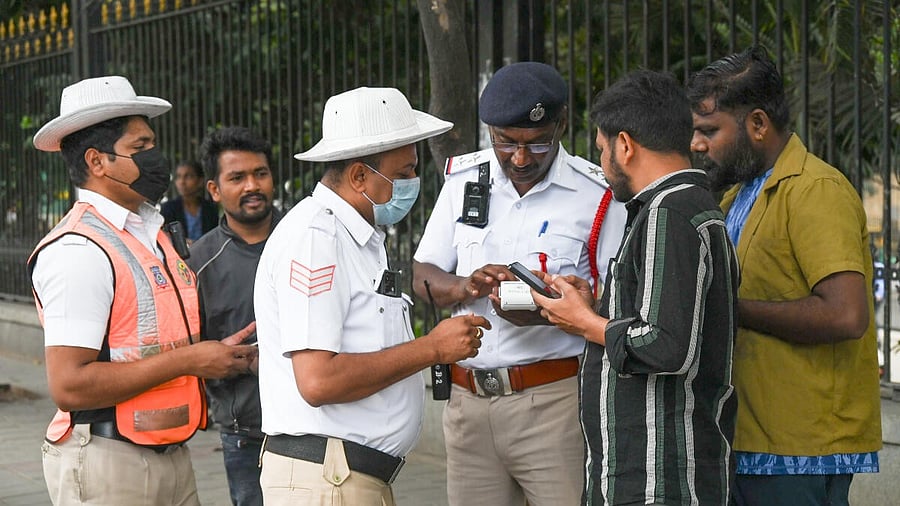
Traffic Police collecting fine from traffic rules violated motorist in special drive
Credit: DH File Photo
The Karnataka government’s decision to once again offer a 50% discount on unpaid traffic fines is a misguided policy that undermines the very foundation of road safety. The latest scheme, valid from November 21 to December 12, covers unpaid police e-challans and decades-old RTO violation fees. This is the fifth such discount since 2023, reinforcing the impression that traffic enforcement in the state is negotiable. The government argues the move will help clear the long-pending backlog and offer relief to motorists. But it appears to have lost sight of the fact that a penalty is meaningful when it acts as a deterrent – fines work only when they hurt. That is precisely why the Motor Vehicles Act was amended in 2019 to substantially increase penalties and curb dangerous road behaviour. By repeatedly placing a discount sticker on reckless driving, the government is effectively diluting the intent of that reform, normalising violations, and putting public safety up for sale.
Habitual offenders now know they simply need to wait for the next round of concessions. Traffic violations have been reduced to a periodic clearance sale, sending the wrong message in a state grappling with rising vehicular indiscipline. These ‘amnesty’ schemes may not be new, but they must be rare exceptions rather than routine measures if the law is to retain its authority. When such discounts become frequent, penalties lose their sting and compliance becomes optional. Worse, the scheme is unfair to law-abiding citizens. Those who pay their fines promptly and in full are made to feel penalised for their honesty, while persistent violators are rewarded for delaying payment. Such concessions erode public trust, weaken enforcement, and encourage a cynical view of the law as something that can always be bargained down. Critics also point out that the scheme prioritises short-term revenue over meaningful, long-term reform in enforcement, driver education, and licensing.
Karnataka's recurring discount scheme is indefensible against the backdrop of India’s dismal road safety record. In 2024, the country recorded 4.73 lakh accidents and 1.70 lakh deaths – an average of 465 fatalities every day. Over-speeding remains the single biggest killer, and the most affected age group is 18-45 years. The country has pledged to halve road crash deaths by 2030 under the Stockholm Declaration, but the current trend shows it is nowhere close. If Karnataka is serious about saving lives, it must stop treating penalties as flexible. Traffic fines cannot be a seasonal sale, and safety cannot be achieved when violations are perpetually on discount.
